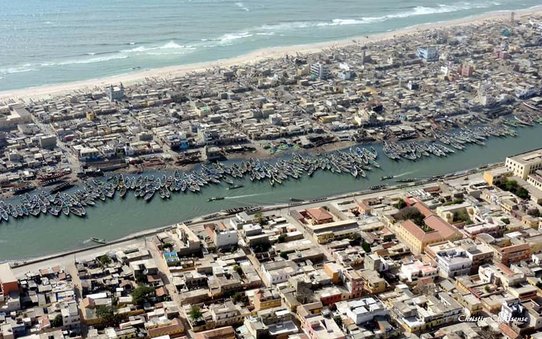saint-louis
Saint-Louis is situated on the river Senegal, right at the Mauritanian border. Saint-Louis is also where Europe and Africa meet: the town was founded by the French in 1659, and for a long time, it was the capital of the whole of French West Africa. The local architecture is the strongest witness of the colonial heritage. For centuries, the French lived sided by side by local populations, resulting in interesting hybrid cultural expressions. The signares, ladies of mixed racial backgrounds, were influential cultural actors.
Saint-Louis can be divided into three main parts: the island in the Senegal river, the outer peninsula and the mainland. The island, Ndar, seduces the visitor with its quiet streets and picturesque views. It is a Unesco classified area with colonial houses from the 19th and early 20th centuries, many of which are in dire need of restoration. Between the river and the Atlantic is the long and narrow Langue de Barbarie peninsula, home to a large community of Lebou fishermen. Its shores are bustling with activity: boats are painted, nets repaired, fish is smoked and dried, kids are playing football in the sandy and often dirty alleyways. Further south along the peninsula you find beach hotels – could the contrast be greater? Finally, the mainland part of Saint-Louis, Sor, is where the main market and largest residential areas are situated. At some distance from town is the campus of Université Gaston Berger, probably the best university in Senegal, with 7,000 students, coming from all over West Africa.
Today, the town counts over 250,000 inhabitants. The dominant ethnic group is the Wolof, and the Wolof language is the lingua franca alongside the official French. There is a sizeable Fulani/Peul-speaking community; you may also meet Mauritanian ladies veiled in thin coulourful fabrics, Guinean fruit sellers and Lebanese businessmen. Some of the Frenchmen in Saint-Louis have local roots going back a century or two.
Culture in Saint-Louis
The colonial past lives on in the Fanal processions, which take place around Christmas and the New Year. The Senegalese simb ("false lion") tradition is strong in Saint-Louis, with a dedicated festival. Also the muslim New Year, Tamxarit is celebrated in a particularly colourful manner here.
What the town may have lost in the way of strategic and economic importance over the last century, it is today taking back in the cultural field. Senegalese popular music is omnipresent. You can see mbalax bands every weekend. Souleymane Faye and Abdou Guité Seck, the town's famous sons, are performing every now and then. The long-standing Saint-Louis jazz festival takes place in late May every year; the Rapandar festival caters for the rap enthusiasts. In addition to concerts, you can catch Zikroullah trance music, performed by members of the Baye Fall brotherhood all over town at night, especially on Thursdays, as well as sabar street parties, where women show off their dancing skills between themselves. A festival for contemporary dance, Duo Solo, is organised in June and documentary film events take place at irregular intervals. There are also a few art galleries in town.
With its picturesque urban decay, Saint-Louis is the place for nostalgia freaks. The architectural heritage on the island is officially cherished and well documented, but restoration actions are insufficient and renovation is often carried out without respect for traditions.
A pleasant climate
As Saint-Louis is situated by the Atlantic and at the edge of the Sahara desert. For most of
the year (December-June), the climate is pleasantly warm and dry with average daytime temperatures of 25-30 degrees Celsius and 15-20 degrees at night. The hot and humid rainy season (day 35, night 25 degrees) lasts from August to October. In December-February, the Harmattan wind is often blowing in dust from the Sahara.
Cultural agenda
- varies from year to year
August
Tabaski, religious festival
September
Tamxarit, religious festival
October/November
Boat races
December
Entre'vues heritage event: open houses and courtyards
Métissons music festival
Africadoc documentary film festival
Literature festival
April
Saint-Louis Jazz
May/June
Duo Solo contemporary dance festival
Ramadan and Korité: religious festival
Irregular - not every year
Rapandar music festival
Festival du Sahel
Please note that, except for the religious festivals, these are rather small-scale events.
